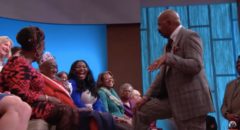
Older Black Americans are much more likely to have good hearing than white Americans, and the difference is especially notable among men, a new study shows.
“We found that among males, non-Hispanic Black Americans have a prevalence of hearing loss that is similar to non-Hispanic white Americans who are 10 years younger,” co-author ZhiDi Deng, a pharmacy student at the University of Toronto, said in a school news release.
Learning more about racial/ethnic differences in hearing loss may help improve prevention efforts, according to the authors.
They found that Black Americans 65 and older were nearly half as likely to report serious hearing loss in 2016 and 2017 (about 9%) as white Americans in that age group (about 15%).
RELATED: Ten Ways You May Be Ruining Your Hearing
After accounting for age, sex, income and education levels, the researchers concluded that older Black Americans were 91% less likely to have hearing loss than white people in the same age group, according to the study.
“The racial/ethnic difference in hearing problems is intriguing,” study co-author Esme Fuller-Thomson, director of University of Toronto’s Institute of Life Course and Aging says.
“Hearing loss is one of the most common chronic problems affecting older adults," she said in the release. "Those with hearing loss tend to have lower quality of life and a higher prevalence of depression and hospitalization. Understanding the causes and drivers behind the racial/ethnic differences in hearing loss can help us design better preventative strategies as the Baby Boom cohort ages.”
Relevant factors may include racial/ethnic differences in diet, smoking, noise exposure and bone density, the researchers suggest.
“More research is needed to understand the extraordinary differences in hearing,” Fuller-Thomson shares.
Signs of Hearing Loss
Some people may have a hearing problem and without realizing it.
If you experience any of the following, you should talk with your doctor:
- Have trouble hearing over the telephone
- Find it hard to follow conversations when two or more people are talking
- Often ask people to repeat what they are saying
- Need to turn up the TV volume so loud that others complain
- Have a problem hearing because of background noise
- Think that others seem to mumble
- Can’t understand when women and children speak to you
The most important thing you can do is seek professional advice for your hearing problems.
Your family doctor will be able to diagnose and treat your hearing problem or refer you to other experts, like an otolaryngologist (ear, nose, and throat doctor) or an audiologist (a health professional who can identify and measure hearing loss).
RELATED: Could Your Hearing Loss Lead to Dementia?
How to cope with hearing loss
Additionally, you can try the following tips to cope with or help someone with hearing loss suggested by the NIH:
- Let people know you have a hearing problem.
- Ask people to face you and to speak more slowly and clearly. Also, ask them to speak louder without shouting.
- Pay attention to what is being said and to facial expressions or gestures.
- Let the person talking know if you do not understand what he or she said.
- Ask the person speaking to reword a sentence and try again.
- Find a good location to listen. Place yourself between the speaker and sources of noise and look for quieter places to talk.









